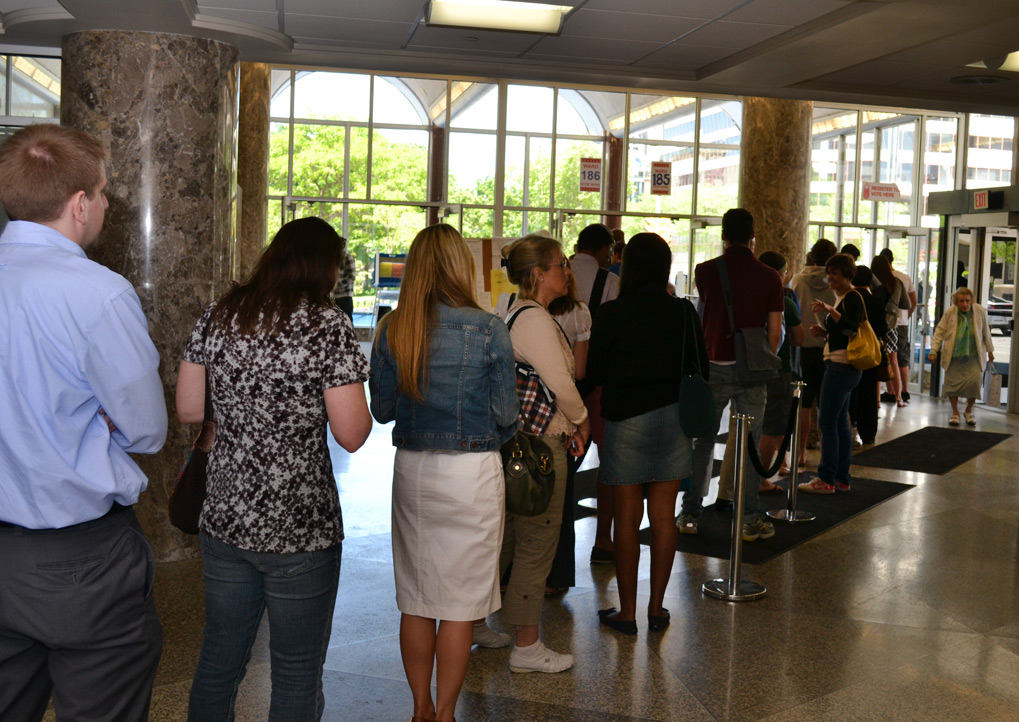Voters’ Rights Are In Peril, Experts Say
Voter ID, roadblocks to voting discussed by panel at MU event.
When it comes to proving you are who you say you are at polling locations on election day, there is widespread support for the concept.
At least at first glance.
But a pair of advocates with expertise in voters’ rights say they are growing increasingly concerned with new laws that have been enacted in 20 states since the 2010 election.
Journalist Mike Gousha, who hosts periodic panel discussions under the moniker On the Issues at Marquette University, recently had a sit-down conversation on the topic with Atiba Ellis and Molly McGrath.
Ellis, a native of North Carolina, is a visiting professor at Marquette University Law School. McGrath, a native Wisconsinite, is part of the American Civil Liberties Union’s Voting Rights Project.
Voter ID supporters have frequently asserted the laws bring a sense of integrity to elections and prevent voter fraud. But opponents say the new laws make it harder to vote and have a disproportionate impact on minority communities.
During their hour-long conversation with Gousha before a crowd of about a hundred people on Nov. 16, Ellis and McGrath said they are concerned by the state of voters’ rights locally and elsewhere.
While there has been speculation about and claims of voter fraud, Ellis said much of it is ado about nothing. He pointed to a Loyola University study that found just 31 votes of a billion cast had the potential for fraud — and some of the those 31 instances were not verifiably fraudulent.
“I call this a partisan feedback loop,” Ellis said of the concept of voter fraud and how IDs play into the equation. “Both parties are weaponizing it.”
Wisconsin’s voter ID law, which was first presented by state Republican lawmakers five years ago, requires that residents present one of multiple forms of ID, including a driver’s license, military ID, tribal ID, naturalization papers or a state-issued ID. A student ID also is permissible, so long as it has a signature and a two-year expiration date.
For most Wisconsinites, the requirements appear reasonable, as Gousha pointed out from polling data.
“There is sort of this prevailing sentiment out there,” Gousha said.
But for eligible voters without the permissible IDs in Wisconsin and many of the other 19 states with stiffened laws, they face a quagmire of confusion, Ellis and McGrath said
According Wisconsin law, residents without the permissible forms of ID can obtain one through a Department of Motor Vehicles office and not pay additional fees — including obtaining birth certificates — to have to obtain a permissible ID.
McGrath, however, said the law is not always followed. She said newcomers or longtime residents looking to follow the letter of the law have been faced with varying responses from different DMV offices.
In one instance, McGrath said a DMV staffer told a new Wisconsinite he would be better off obtaining his birth certificate in his home state of Illinois than wading through the steps in place at the state agency office.
“I was very upset by this,” McGrath said. “I was shocked that this was happening.”
Amid concerns about the state of voters’ rights, Ellis and McGrath said they are optimistic that better measures will be in place in the future so the integrity of elections are in place, while ensuring voters have the right to head to the polls without roadblocks.
“This is a fundamental issue here,” McGrath said. “We have to look at voting as a right — a right that is unique and special.”
To that end, she added: “We should demand better from our democracy.”






















Here in Wisconsin, we have been hit with every despicable trick in the book to disenfranchise voters. Before the ID law was enacted, Gov. Walker closed and/or cut back hours on all the DMV offices, where people are supposed to obtain IDs. Afterward, Republicans shut down the Government Accountability Board (GAB) and cut all funding for education and advertising how to navigate the changing rules. Let’s not overlook our standing as having one of the most gerrymandered district maps in the country, which puts Democrats at a distinct disadvantage for winning majorities in Congress or the State Legislature. Registration drives, early voting days and hours, polling hours; all were outlawed or drastically reduced. Add to that those scary billboards threatening prison time if caught trying to vote without the proper ID and you have strong disincentives to even try to vote. This is not democracy. Thanks to the ACLU and Marquette University for showcasing the issue. Its importance cannot be overstated.
Truth.